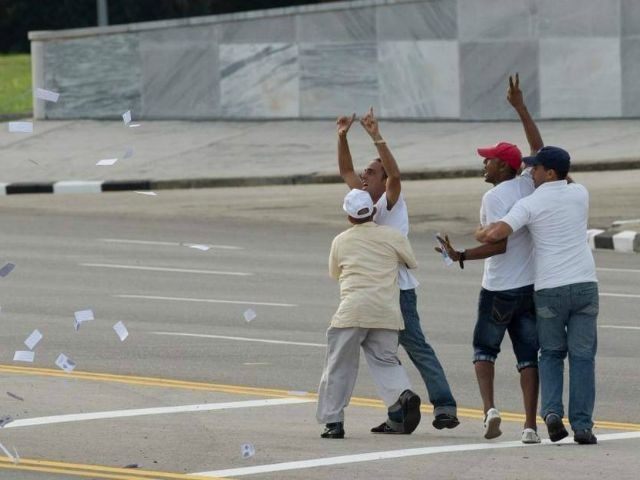For the 26th Sunday in a row, Cuban police have arrested upwards of one hundred dissidents for attempting to organize a peaceful anti-communist assembly. The arrests come at a time when American business interests appear more intrigued than ever with the prospect of investing in the Cuban regime.
Protesters from two dissident groups, the Ladies in White organization and the Cuban Patriotic Union (UNPACU), have begun a movement on social media called #todosmarchamos– “#weallmarch”– to organize dissidents to engage in civil assemblies against Raúl Castro and his government. Over 150 people were arrested this Sunday for attempting to attend a #todosmarchamos march, most placed under house arrest on Friday night to prevent them from leaving their homes.
About half of the dissidents were members of either group. On their webpage, the Ladies in White report that 80 of the arrested were members of UNPACU, including the organization’s leader, José Daniel Ferrer.
While most were arrested– and most are, only to be detained once again the next Sunday– many members of both organizations remain behind bars. Among the most prominent dissidents still in jail and currently engaged in a hunger strike is Zaqueo Báez, an UNPACU member arrested for yelling the word “freedom!” after receiving a blessing from Pope Francis. Pope Francis told reporters following the incident that he knew nothing about political arrests in Cuba.
Stories of these weekly arrests are common, and serve the purpose of allowing Cuba to claim it has a very low number of prisoners of conscience, as most are released routinely on short stints before being beaten and arrested again. The human rights situation has become so dire that Amnesty International– whose Cuba page mere months ago boasted more outrage about the free American base at Guantánamo Bay than events on the island itself– has condemned the international silence surrounding the Castro regime’s ceaseless human rights abuses.
Yet a number of American business sectors appear excited to invest in Cuba, disregarding or unaware of the restrictions placed on everything from business ownership to offhand political comments to modern art from Havana. Casino operators, perhaps the most affected by mass nationalization of businesses in the 1960s, are “absolutely” interested in returning to the communist country, according to an expert speaking to Fox Business this month. While most agree that casino owners are hoping for guarantees against expropriation of property, there is no indication the Cuban government would provide such a thing.
The Cuban government has been working to appeal to business-owners who may not be as closely monitoring the lack of market freedoms in Cuba as journalists have. As CNBC notes, the Cuban government “has been trying to pitch the country as a ‘place for foreign investment’ touting tax incentives, a qualified workforce and ‘political, social and legal stability’ as reasons for investment.”
It has worked for some. International trade delegations have increasingly been making their way to Havana. Democratic Congressmen are taking advantage of the opportunity to sightsee in Havana, touting “trade missions” intended to help American businesses spend money in Cuba. Ohio State Rep. Sean O’Brien and Congressman Tim Ryan arrived in Cuba this week to promote Cuba to Ohio businessmen. “They have so many opportunities down there for our businesses to go and do work, and make money, and bring some of those revenues back here,” said Congressman Ryan.
Perhaps even more shockingly, American broadcasters are looking to stake a claim in the Cuban media market, which does not exist. Cuban media is almost entirely state-run, save for a few rogue outlets like 14 y Medio, run by dissident blogger Yoani Sánchez, which routinely comes under attack from pro-government hackers. According to a report in Politico, the National Association of Broadcasters will send representatives to Havana this week to explore the “extraordinary opportunity to open doors” in Cuba.
As Cuban-American Babalú Blog notes, “The regime has not allowed free expression for more than five decades and routinely jails independent journalists, librarians, and artists who dare to criticize or challenge their murderous and repressive dictatorship.”
In addition to censorship within Cuba, however, Raúl Castro has made clear on multiple occasions that he expects to have the power to censor American media as a result of President Obama’s diplomatic concessions to him made throughout the year. In July, before an international audience, Castro demanded that “radio and television broadcasts towards Cuba, which violate international norms and hurt our sovereignty, cease,” referring to Radio and TV Martí, U.S. publicly broadcast media covering Cuban-American topics of interest. Castro made the same demand at the United Nations General Assembly in September, calling for ““the cessation of radio and television broadcasts meant to destabilize.” The State Department has not yet responded to Castro’s call for American politicians to censor American media outlets.

COMMENTS
Please let us know if you're having issues with commenting.